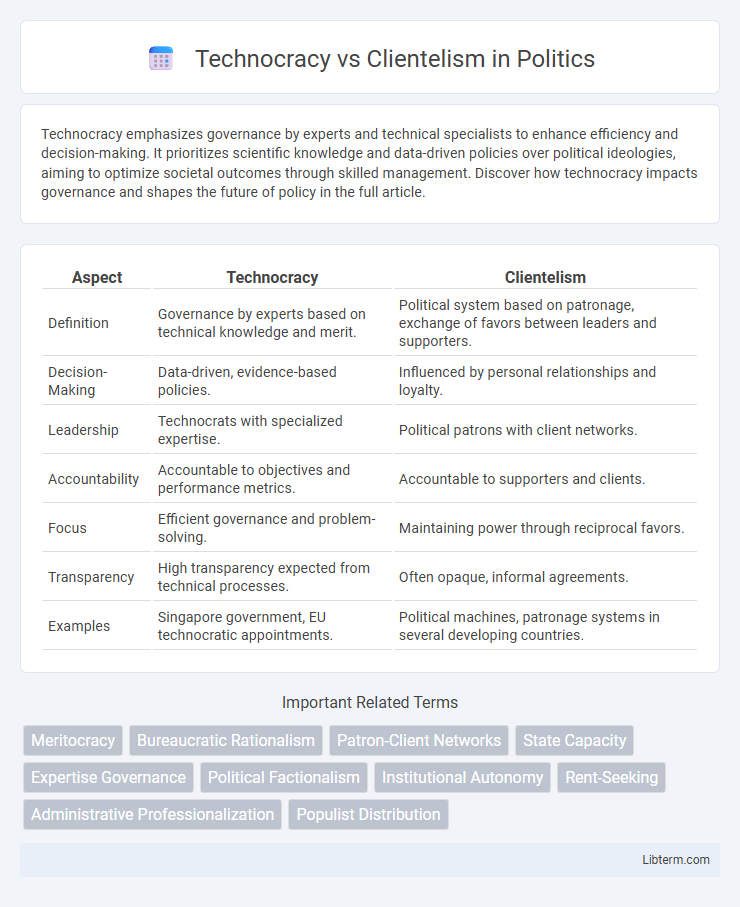Technocracy emphasizes governance by experts and technical specialists to enhance efficiency and decision-making. It prioritizes scientific knowledge and data-driven policies over political ideologies, aiming to optimize societal outcomes through skilled management. Discover how technocracy impacts governance and shapes the future of policy in the full article.
Table of Comparison
| Aspect | Technocracy | Clientelism |
|---|---|---|
| Definition | Governance by experts based on technical knowledge and merit. | Political system based on patronage, exchange of favors between leaders and supporters. |
| Decision-Making | Data-driven, evidence-based policies. | Influenced by personal relationships and loyalty. |
| Leadership | Technocrats with specialized expertise. | Political patrons with client networks. |
| Accountability | Accountable to objectives and performance metrics. | Accountable to supporters and clients. |
| Focus | Efficient governance and problem-solving. | Maintaining power through reciprocal favors. |
| Transparency | High transparency expected from technical processes. | Often opaque, informal agreements. |
| Examples | Singapore government, EU technocratic appointments. | Political machines, patronage systems in several developing countries. |
Introduction to Technocracy and Clientelism
Technocracy is a governance system where decision-making power is vested in experts and specialists based on their technical knowledge and expertise, emphasizing efficiency and data-driven policies. Clientelism involves a political system characterized by reciprocal exchanges between patrons and clients, where support is secured through personal favors or resources rather than merit-based criteria. Understanding the fundamental principles of technocracy and clientelism highlights contrasting approaches to authority and policy formulation in political systems.
Defining Technocracy: Principles and Operations
Technocracy is a governance system where decision-making authority is vested in experts and technical specialists based on their knowledge and expertise rather than political considerations or popular votes. It operates on principles of rationality, efficiency, data-driven policies, and technical competence, prioritizing evidence-based solutions to societal problems. Technocratic governance typically involves non-partisan administrators who implement policies guided by scientific methods and systematic analysis, distinct from clientelist systems driven by personal loyalty and patronage networks.
Understanding Clientelism: Key Characteristics
Clientelism is a political system characterized by the exchange of goods or services for political support, often involving a hierarchical network between patrons and clients. Key characteristics include personalized relationships, favoritism in resource distribution, and the lack of institutional transparency, which undermine democratic processes. Unlike technocracy, which emphasizes expertise and merit-based governance, clientelism thrives on loyalty and reciprocal obligations rather than policy efficiency.
Historical Context: Origins and Evolution
Technocracy emerged during the early 20th century as a response to industrialization and the demand for expert-led governance focused on efficiency and scientific management, notably gaining traction in the 1930s United States and Europe. Clientelism, deeply rooted in pre-modern societies, evolved from traditional patron-client relationships where political support is exchanged for material benefits, with significant prevalence in developing countries and historical political systems like ancient Rome and feudal Europe. The evolution of technocracy reflects modernization and institutional specialization, whereas clientelism persists in contexts with weak formal institutions and personalized political networks.
Technocracy in Modern Governance
Technocracy in modern governance emphasizes decision-making based on expertise, data-driven policies, and scientific knowledge to achieve efficient public administration and sustainable development. This approach contrasts sharply with clientelism, where political support is exchanged for personal favors, often undermining transparency and long-term policy effectiveness. By prioritizing expert analysis and technical competence, technocratic governance aims to reduce corruption and enhance institutional trust in democratic systems.
Clientelism’s Impact on Political Systems
Clientelism undermines democratic institutions by fostering dependency between politicians and voters through the exchange of goods or services for political support, which distorts electoral competition and policy-making processes. Its impact on political systems includes the entrenchment of corruption, erosion of transparency, and weakening of accountability mechanisms, leading to inefficient governance and reduced public trust. Persistent clientelistic networks hinder socioeconomic development by prioritizing personal loyalty over merit and policy effectiveness.
Efficiency or Patronage: Policy Implementation Compared
Technocracy emphasizes efficient policy implementation through expert-driven decision-making and data-oriented strategies, minimizing political influence and reducing bureaucratic delays. Clientelism relies heavily on patronage networks, where policy outcomes are often shaped by reciprocal exchanges rather than merit, leading to inefficiencies and favoritism. Studies reveal that technocratic systems typically produce more consistent and transparent governance, while clientelist structures often prioritize loyalty over performance, impeding effective service delivery.
Technocracy vs Clientelism: Case Studies
Technocracy emphasizes decision-making by experts with specialized knowledge, promoting efficient policy implementation as seen in Singapore's rapid urban development. Clientelism relies on reciprocal relationships between patrons and clients, often resulting in political favoritism and resource allocation based on loyalty, exemplified by Brazil's patronage networks. Comparative analysis of these models reveals technocracy's capacity for merit-based governance, while clientelism persists in contexts with weaker institutional frameworks.
Social and Economic Outcomes: A Comparative Analysis
Technocracy emphasizes governance by experts who prioritize data-driven policies, leading to efficient resource allocation and sustainable economic growth, often resulting in higher social welfare indicators. In contrast, clientelism relies on personal networks and patronage, which can create economic distortions, foster corruption, and exacerbate inequality, negatively impacting social development. Comparative studies show technocratic regimes tend to achieve better public service delivery and economic stability, whereas clientelist systems may undermine institutional trust and long-term socioeconomic progress.
Future Prospects and Reform Strategies
Technocracy emphasizes data-driven governance and expert decision-making, positioning it as a promising model for efficient, transparent public administration in the future. Reform strategies favor enhancing institutional capacity, fostering meritocratic recruitment, and incorporating advanced technologies like AI for policy analysis. In contrast, clientelism relies on patronage networks, often hindering democratic accountability and requiring anti-corruption measures and voter education programs for meaningful reform.
Technocracy Infographic

 libterm.com
libterm.com